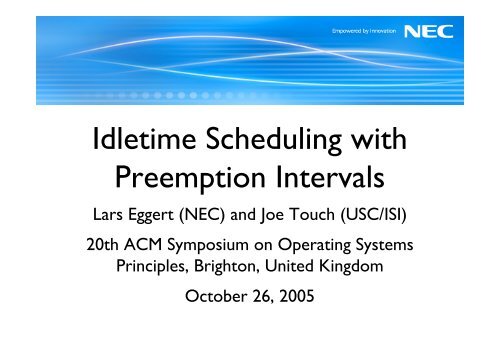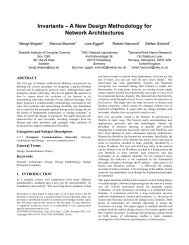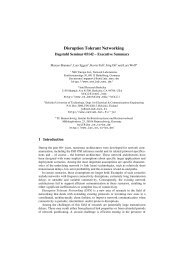Idletime Scheduling with Preemption Intervals - Lars Eggert
Idletime Scheduling with Preemption Intervals - Lars Eggert
Idletime Scheduling with Preemption Intervals - Lars Eggert
You also want an ePaper? Increase the reach of your titles
YUMPU automatically turns print PDFs into web optimized ePapers that Google loves.
<strong>Idletime</strong> <strong>Scheduling</strong> <strong>with</strong><br />
<strong>Preemption</strong> <strong>Intervals</strong><br />
<strong>Lars</strong> <strong>Eggert</strong> (NEC) and Joe Touch (USC/ISI)<br />
20th ACM Symposium on Operating Systems<br />
Principles, Brighton, United Kingdom<br />
October 26, 2005
2<br />
<strong>Lars</strong> <strong>Eggert</strong> <br />
Motivation<br />
• use available bandwidth “in the background”<br />
• best effort vs. “least effort”<br />
• IP differentiated services extensions OK<br />
• but what if the bottleneck is in the host?<br />
• diffserv forwarding at routers is ineffective if<br />
there are no queues<br />
• need diffserv-like mechanism in the OS<br />
2005-10-26
3<br />
<strong>Lars</strong> <strong>Eggert</strong> <br />
Challenges<br />
• system bottleneck resource depends on<br />
current workload & changes dynamically<br />
• scheduler of current bottleneck resource<br />
dominates overall system behavior<br />
• don’t want to change all schedulers & queues<br />
• some may be in hardware<br />
• don’t want to modify apps for FG or BG<br />
2005-10-26
4<br />
<strong>Idletime</strong> Service<br />
• system-wide, least-priority service class<br />
• default service class = FG<br />
(inverse of traditional QoS)<br />
• in some sense, generalization of POSIX “idprio”<br />
CPU scheduling<br />
• ideal: utilize all available capacity of all resources for<br />
BG work – <strong>with</strong> zero impact on FG work<br />
• talk focuses on temporally shared resources, paper<br />
discusses ideas for spatially shared (storage)<br />
<strong>Lars</strong> <strong>Eggert</strong> <br />
2005-10-26
5<br />
Applications & Benefits<br />
• prefetching/caching = reduce access costs<br />
• disk: block replication, arm movement<br />
• network: IKE, DNS, PMTU, “prefetch means”<br />
• currently: conservative limits to avoid overload<br />
• system optimization & maintenance<br />
• fsck, defrag, virus scan, update, etc.<br />
• process/data migration systems<br />
• Condor, Sprite, x@home, Mether, etc.<br />
• coarse-grained, single-resource, remote benefit<br />
<strong>Lars</strong> <strong>Eggert</strong> <br />
2005-10-26
6<br />
<strong>Lars</strong> <strong>Eggert</strong> <br />
Goals<br />
• ideal: utilize all available capacity of all resources for<br />
BG work <strong>with</strong> zero impact on FG<br />
• difficult: high preemption costs <strong>with</strong>out hardware<br />
support, always some preemption costs<br />
• primary goal: minimize FG impact<br />
• or people won’t use it<br />
• secondary goal: reasonable BG throughput<br />
2005-10-26
7<br />
1. isolation<br />
<strong>Idletime</strong> Principles<br />
• BG side effects interfere <strong>with</strong> FG<br />
• can affect FG correctness & performance<br />
2. prioritization<br />
• never serve BG if FG queued<br />
3. preemptability<br />
• preempt/abort BG when FG arrives<br />
• preemption cost – main factor delaying FG<br />
<strong>Lars</strong> <strong>Eggert</strong> <br />
2005-10-26
9<br />
Work Conservation<br />
• never remain idle <strong>with</strong> work queued<br />
(and never destroy completed work)<br />
• challenge: OS + hardware = queue hierarchy<br />
• hierarchy level implies priority<br />
• causes lower-level BG to delay higher-level FG<br />
<strong>Lars</strong> <strong>Eggert</strong> <br />
2005-10-26
10<br />
<strong>Lars</strong> <strong>Eggert</strong> <br />
Idea<br />
• work conservation for BG creates idletime<br />
worst-case<br />
• preemption before each FG request<br />
• up to 50% impact when active BG must<br />
run to completion<br />
• idea: relax work conservation for BG only<br />
• limit preemptions = limit FG impact<br />
2005-10-26
12<br />
<strong>Lars</strong> <strong>Eggert</strong> <br />
Behavior<br />
• PI creates bursts of FG requests<br />
• max. 1 preemption/burst<br />
• limits FG impact<br />
2005-10-26
13<br />
<strong>Idletime</strong> Scheduler<br />
• priority queue + PI scheduling<br />
states<br />
F = FG active<br />
B = BG active<br />
P = idle in PI<br />
I = idle<br />
<strong>Lars</strong> <strong>Eggert</strong> <br />
events<br />
f = FG in queue<br />
b = BG in queue<br />
t = PI expires<br />
i = queue empty<br />
2005-10-26
14<br />
Consequences<br />
• idletime scheduling suspends BG work at<br />
higher levels<br />
• can’t interfere <strong>with</strong> FG at lower levels<br />
• can be implemented as localized<br />
modifications – extend traditional OS<br />
• how long to suspend BG work conservation<br />
for?<br />
<strong>Lars</strong> <strong>Eggert</strong> <br />
2005-10-26
15<br />
shorter PI<br />
utilize more idle capacity<br />
higher FG impact<br />
increase BG performance<br />
<strong>Lars</strong> <strong>Eggert</strong> <br />
PI Length<br />
• parameter: controls scheduler<br />
• FG impact ~ BG performance<br />
• effective PI length?<br />
2005-10-26<br />
longer PI<br />
utilize less idle capacity<br />
reduce FG impact<br />
decrease BG performance
16<br />
<strong>Lars</strong> <strong>Eggert</strong> <br />
Short PIs<br />
• too short = ineffective<br />
• mechanism degenerates into priority queue<br />
• no cost limit = no FG impact reduction<br />
2005-10-26
17<br />
<strong>Lars</strong> <strong>Eggert</strong> <br />
Long PIs<br />
• too long = waste idle capacity<br />
• poor BG throughput<br />
• limited usefulness<br />
2005-10-26
18<br />
Effective PI Lengths<br />
• factors: resource, workload, user policy<br />
• lower bound: create FG burst length > 1<br />
• otherwise: no cost amortization<br />
• upper bound: FG inter-arrival gap<br />
• otherwise: BG starvation<br />
<strong>Lars</strong> <strong>Eggert</strong> <br />
2005-10-26
20<br />
Implementation<br />
• localized modifications to FreeBSD 4.7<br />
• disk: replace disksort()<br />
• network: new ALTQ discipline, tag packets<br />
• begin PI <strong>with</strong> FG request, not at end = simplify code<br />
• expectation: PI < service time ineffective<br />
• PI expires while FG active, system degenerates<br />
into priority queue<br />
<strong>Lars</strong> <strong>Eggert</strong> <br />
2005-10-26
21<br />
Experimental Setup<br />
FG intensity:<br />
variable<br />
<strong>Lars</strong> <strong>Eggert</strong> <br />
PI length:<br />
variable<br />
(intensity = % cycles used to generate load)<br />
2005-10-26<br />
BG intensity:<br />
fixed unlimited
22<br />
• FG/BG throughput<br />
<strong>Lars</strong> <strong>Eggert</strong> <br />
Metrics<br />
• normalize against baseline (= no BG)<br />
• contour plot: lighter shades = better<br />
2005-10-26
23<br />
<strong>Lars</strong> <strong>Eggert</strong> <br />
Expectations<br />
2005-10-26
24<br />
<strong>Lars</strong> <strong>Eggert</strong> <br />
Disk Setup<br />
• UFS file system, random data<br />
• single disk, isolated ATA channel<br />
• 8.2GB Western Digital Caviar AC28200<br />
• 15ms maximum seek + 5ms latency<br />
(mean)<br />
• FG + BG randomly read 512-byte blocks<br />
• Pentium III SMP, 733Mhz, 512MB RAM<br />
2005-10-26
25<br />
Disk: Random Access<br />
• FG > 80%, BG ≤ 90% of baseline throughput<br />
• 20% impact ~ 1 BG request (20ms seek)<br />
<strong>Lars</strong> <strong>Eggert</strong> <br />
2005-10-26
26<br />
Network Setup<br />
• direct, isolated LAN link (cross-over cord)<br />
• Intel PRO/1000F 1Gb/s Ethernet fiber<br />
• source + sink hosts<br />
• Pentium III SMP, 733Mhz, 512MB RAM<br />
• combinations of UDP + TCP<br />
<strong>Lars</strong> <strong>Eggert</strong> <br />
2005-10-26
27<br />
Network: UDP/UDP<br />
• FG > 90% + BG ≤ 90% of baseline<br />
• except: low intensity = short FG burst<br />
<strong>Lars</strong> <strong>Eggert</strong> <br />
2005-10-26
28<br />
Network TCP/UDP<br />
• worst case: FG TCP vs. greedy BG UDP<br />
• PI length ~ RTT? (1.25ms minimum RTT)<br />
<strong>Lars</strong> <strong>Eggert</strong> <br />
2005-10-26
29<br />
Related Work<br />
• realtime systems – resource reservations<br />
• computation deadlines, predictability<br />
• network diffserv/QoS – many mechanisms<br />
• L2: drop priority flag (ATM, FR)<br />
• L3: IP TOS, diffserv, intserv, prop-share<br />
• L4: TCP-LP, TCP Nice, MulTCP<br />
• L7: Mozilla, BITS, LSAM, push-polite<br />
<strong>Lars</strong> <strong>Eggert</strong> <br />
2005-10-26
30<br />
Related Work (2)<br />
• idle capacity consumers<br />
• process & data migration<br />
• prefetching & caching<br />
• anticipatory scheduling<br />
• disk performance through locality<br />
• MS Manners<br />
• reactive monitoring, app cooperation<br />
• other OS can be configured/extended (Scout, etc.)<br />
<strong>Lars</strong> <strong>Eggert</strong> <br />
2005-10-26
31<br />
• paper<br />
Additional Work<br />
• ideas for extending this to storage resources<br />
• idletime networking improvements (inbound<br />
processing)<br />
• elsewhere<br />
• analytical model of idletime scheduling<br />
predicts behavior <strong>with</strong> >85% accuracy<br />
• experimental analysis of FG/BG latency<br />
<strong>Lars</strong> <strong>Eggert</strong> <br />
2005-10-26
32<br />
• generic idletime scheduler based on relaxing<br />
work conservation for BG work during<br />
preemption intervals<br />
• resource + workload independent<br />
• disk + network implementation<br />
• FG > 80%<br />
• BG < 90%<br />
<strong>Lars</strong> <strong>Eggert</strong> <br />
Conclusion<br />
baseline throughput<br />
2005-10-26





